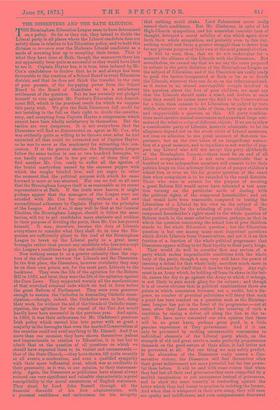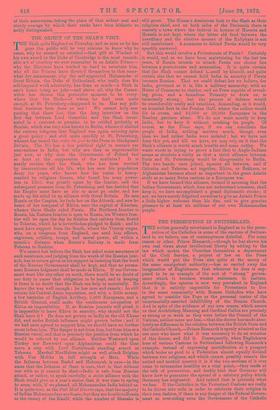THE DISSENTERS AND THE BATH ELECTION.
THE Birmingham Education League seem to have determined on a policy. So far as they can, they intend to divide the Liberal party in all places where the Liberal candidate does not satisfy them in relation to his Education policy, and to hold this division in terrorem over the Moderate Liberal candidate as a mode of screwing him up to accepting their terms. That is what they have done at Bath, though the manceuvre there has not apparently been quite as successful as they would have liked to see it. Captain Hayter has, it is true, been induced by Mr. Cox's candidature to declare that he is and always has been favourable to the creation or a School Board in every Education district, and that he does not think the transfer, in the case of poor parents, of the fee-paying power from the School Board to the Board of Guardians to be a satisfactory settlement of the question. But he has certainly not pledged himself to vote against Mr. Forster's Education Act Amend- ment Bill, which is the practical result for which we suppose this party wish. We give the Bath Dissenters full credit for not insisting to the full on their right to divide the constitu- ency, and accepting from Captain Hayter a compromise which cannot have been wholly satisfactory to themselves. But the tactics are very dangerous. It is not everywhere that the Dissenters will find so disinterested an agent as Mr. Cox, who was evidently quite as willing to be thrown over, after he had extracted all that could be extracted out of Captain Hayter, as he was to serve as the machinery for extracting this con- cession. If at the general election the Birmingham League follow the same tactics in one or two hundred boroughs, we can hardly expect that in ten per cent. of them they will find another Mr. Cox, ready to suffer all the agonies of the brutal martyrdom caused by the cayenne pepper with which the roughs blinded him, and yet eager to retire the moment that the political purpose with which he came forward is more or less attained. Nor can we feel at all sure that the Birmingham League itself is as reasonable as its recent representative at Bath. If the truth were known, it might perhaps appear that the managers of the League were not satisfied with Mr. Cox for retiring without a full and unconditional adherence by Captain Hayter to the principles of the League. And if so, it may well be that at the General Election, the Birmingham League, should it follow the same tactics, will try to get candidates more obstinate and reckless in their purpose of dividing the party, than Mr. Cox has proved himself. It may, therefore, become the duty of Liberals everywhere to consider what they shall do, in case the Dis- senters are sufficiently pliant to the lead of the Birmingham League to break up the Liberal party in a great many boroughs rather than permit any candidate who does not accept the League's conditions to gain the undivided Liberal vote. Now nothing seems to us a greater calamity than the rup- ture of the alliance between the Liberals and the Dissenters. In the first place, the Dissenters, however crotchetty they may be on their own points, are, for the most part, Liberals to the backbone. They were the life of the agitation for the Reform Bill in 1832, and later, they were the life of the agitation against the Corn Laws. They supported warmly all the ameliorations of that wretched criminal code which we had in force before the great Reform of Parliament. They were even generous enough to sustain the Catholics in demanding Catholic eman- cipation,—though, indeed, the Catholics were, in fact, doing their work, for without the aid of the friends of Catholic eman- cipation, the agitation for the repeal of the Test Act would hardly have been successful in the previous year. And again, in 1868, it was their enthusiasm for Mr. Gladstone's generous Irish policy which carried him into power with so great a majority in the boroughs that even the marked Conservatism of the counties could not avail anything to Mr. Disraeli. And if on more than one occasion they have shown themselves jealous and impracticable in relation to Education, it is but fair to admit that on the question of all questions on which we should have expected them to be violent and unreasonable,— that of the State Church,—they have shown, till quite recently at all events, a moderation, and even a qualified sympathy with their more influential rival, which was as creditable to their generosity, as it was, in our opinion, to their statesman- ship. Again, the Dissenters as politicians have almost always evinced one very significant and valuable characteristic, a great susceptibility to the moral earnestness of English statesmen. They stood by Lord John Russell through all the financial discredit of his first administration, with a personal confidence and enthusiasm for his integrity
that nothing could shake. Lord Palmerston never really earned their confidence. But Mr. Gladstone, in spite of his High-Church sympathies, and his somewhat casuistic turn of thought, betrayed a moral nobility of aim which again drew forth their whole sympathies, and probably even to this day, nothing would cost them a greater struggle than to desert him for any private purpose of their own at the next general election.
It will be seen, then, that we do not undervalue for a moment the alliance of the Liberals with the Dissenters. But nevertheless, we cannot say that we are any the more prepared to submit to the petty dictation of the Birmingham League on the subject of Education, and if the Dissenters are really ready to push the tactics inaugurated at Bath so far as to divide the Liberals, wherever they can do so, on the infinitesimal and, as it seems to us, almost contemptible scruple involved in the question about the fees of poor children, we must say that the Liberals should make a stand, and declare at once that they would far rather leave the field to the Conservatives for a time, than consent to let Liberalism be judged by tests which, whatever view you take of them, turn upon so minute and inappreciable a question as this. All party combina- tions must involve mutual concessions apd somewhat large esti- mates of the relative value of different objects. If we are to allow a considerable party of Liberals, however admirable, to let its allegiance depend not on the whole circle of Liberal measures, not even on adhesion to one great measure of first-rate im- portance, but on the view taken of an insignificant subsec- tion of a great measure, and to repudiate as not worthy of sup- port any Liberal who will not accept this petty shibboleth of the Birmingham League,—there must be an end of all
Liberal co-operation. It is not even conceivable that a hundred or two independent members will consent to let their politics hinge on this arbitrary little pivot of pauper children's school fees, or even on the far greater question of the exact date when compulsion is to be extended to the rural districts. Those who were in earnest for the purpose of securing a great Reform Bill would never have tolerated a test ques- tion turning on the particular mode of dealing with the political rights of the compound householder ; and yet that would have been reasonable, compared to testing the Liberalism of a Liberal by his view on the subject of the mode of providing for the schooling of poor children. The compound householder's rights stood to the whole question of Reform much in the same relative position, perhaps, as that in which the question concerning the school fees of poor children stands to the whole Education question ; but the Education question is but one among many most important questions which divide Liberals from Conservatives, and yet it is on this fraction of a fraction of the whole political programme that Dissenters appear willing to let their loyalty to their party hinge.
They would do well to consider that any section of a party which makes impracticable conditions with the whole body of the party, though it may very well have the power of insuring a defeat for that whole body, sacrifices much more in future influence for itself than it does for the party. Any regi- ment in an Army which, by holding off from its share in the bat- tle, causes the day to go against the Army to which it belongs, is not likely to actin much glory for its colours ; and though it is of course obvious that in political combinations there are points at which concession becomes, not a credit, but a dis- grace, no number of ,practical politicians will fancy that such a point has been reached on a question such as the Birming- ham League has put in the front of its programme,—not at least, after they have once realised the meaning of such a condition by seeing a defeat all along the line as the re- sult. We have never concealed our own opinion that there will be no great harm, perhaps great good, in a little genuine experience of Tory government. And if it can only be prevented by making unreasonable concessions to individual elements of the Liberal party which, on the strength of old and great services, make perfectly preposterous demands on the good-nature of their allies, it had better not be prevented at all. But one thing we may safely predict. If the alienation of the Dissenters really causes a Con- servative victory, the Dissenters will find themselves after their great achievement not more powerful, but far less power- ful than before. It will be said with some reason that when they had lost all their real grievances they were compelled by a morbid imagination to put annoyances instead of grievances, and to show the same tenacity in contending against the latter which they had learnt to practise in resisting the former. And when that is whispered in their own camp, they will soon see apathy and indifference, and even compassionate disavowal
of their narrowness, taking the place of that ardent zeal and sturdy courage by which their ranks have been hitherto so nobly distinguished.



































 Previous page
Previous page